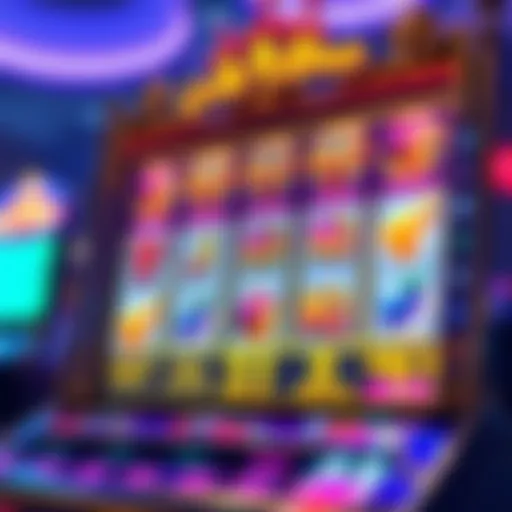Exploring the Casino Landscape in Newark, New Jersey


Intro
Newark, New Jersey, a city with a rich historical tapestry, finds itself on the precipice of an entertainment renaissance. The local landscape is being reshaped by the emergence of casinos that cater to both casual enthusiasts and seasoned players alike. This transformation is more than just about gambling. It encapsulates economic growth, cultural shifts, and state-of-the-art entertainment experiences.
As we explore the casino environment in Newark, it’s essential to recognize how these establishments are influencing the local economy while adding layers of complexity to the longstanding perceptions of gambling. Moreover, the regulatory framework around gambling is evolving, paving the way for new opportunities and challenges.
In this narrative, we’ll unravel the threads that weave together Newark's casino developments, examining the historical underpinnings, the current business landscape, regulatory considerations, and the broader social implications. We'll also peek into what the future might hold for this emerging entertainment hub.
By the end, both seasoned gamblers and neophytes will gain a richer perspective on Newark's unique position in New Jersey's gambling narrative and the potential for further growth.
Prologue to Newark's Casino Scene
The evolution of Newark's casino landscape serves as a fascinating lens through which the complexities of urban development, economic opportunity, and social dynamics can be examined. As the largest city in New Jersey, Newark has seen a considerable resurgence in its entertainment offerings, particularly surrounding the gambling industry. This growing scene is not merely about the casinos themselves, but rather the ripple effect they have on local economy, tourism, and community engagement.
Historically, gambling in Newark has had its ups and downs, reflecting broader societal changes and legislative shifts. In more recent years, casinos have moved from the shadows of underground operations to becoming significant contributors to the city's revitalization. The influx of casinos and gaming establishments provides job opportunities for the locals, drawing in visitors from around the state and beyond, seeking not just gaming but also an array of entertainment options.
This exploration sheds light on several key elements:
- Economic Impact: Casinos contribute significantly to the local economy through taxes and employment, fostering growth in surrounding businesses, from hotels to restaurants.
- Cultural Shift: The perception of gambling has evolved. No longer viewed solely as a vice, casinos are now seen as leisure and entertainment venues that are integral to the urban fabric.
- Regulatory Environment: Understanding the rules and regulations that govern these establishments is crucial, as they shape the operations and experiences offered.
- Future Prospects: As this landscape changes, so too do the opportunities and challenges that lie ahead, from technology advancements in gaming to shifts in consumer preferences.
This section aims to provide not just an overview, but a solid grounding in the broader implications of Newark's casino growth. By examining these aspects, one can appreciate not just the network of establishments themselves, but their role in shaping and enriching Newark's identity.
"Gambling is not merely a pursuit of chance. It intertwines with our economy, culture, and the very fabric of our communities."
Informed by this awareness, readers—including gamblers, marketers, and analysts—will gain valuable insights into how this vibrant casino scene is poised to evolve, making Newark an emerging hotspot in the gambling sector. Understanding the intersection of the local culture, regulatory environment, and economic factors will enhance one's ability to navigate this dynamic landscape effectively.
Historical Context of Gambling in Newark
Understanding the historical context of gambling in Newark is vital for grasping how its current casino landscape came to be. This city has witnessed a transformation influenced by changes in both laws and societal attitudes towards gambling. The historical backdrop sheds light on the evolution of establishments that shaped the local gambling scene, providing crucial insights into present-day operations. From early gaming venues to the modern regulatory environment, the history of gambling in Newark underscores the complexities and dynamics that have defined its growth.
Early Gambling Establishments
Newark's roots in gambling stretch back to the early 20th century when the regulation of games and betting began emerging. Initially, various informal and unregulated gaming joints catered to an adventurous crowd looking for entertainment outside traditional regulations. Notably, illegal card games and dice games were commonplace in back rooms and basements across the city, serving as a quick fix for those seeking excitement and a shot at luck. In this environment, establishments like speakeasies thrived, capitalizing on the underground market, offering not only gambling but also a lively social scene.
"The early gambling culture reflected the spirit of Newark—resilient and bold, navigating the whims of law and society."
The mid-1900s saw a pivotal shift as New Jersey initiated measures to regulate these activities. Though first considered a vice, it turned out to be a burgeoning economic opportunity. The gambling establishments in Newark began taking on a legitimate appearance, though they still faced scrutiny. The gradual acceptance of gambling reflected broader trends in American society, where the mix of recreation and risk began to be viewed as a mainstream form of entertainment.
The Evolution of State Laws
The evolution of state laws surrounding gambling in Newark mirrors the shifting perception of gambling in New Jersey as a whole. The state's constitution underwent amendments and legislative changes throughout the decades. From benign gaming regulations that allowed for lotteries to legalizing offshore betting, each phase highlighted the state’s attempts to balance economic benefit against public concern.
In the 1970s, a landmark decision was made—New Jersey voters approved a referendum to allow legalized casino gambling in Atlantic City. This was a significant shift, paving the way for renewed discussions on the potential impact of casinos in not just Atlantic City but also Newark. Over these years, Newark began to tap into this potential alignment with the law, creating an environment that was receptive to major investments in gaming.
Transition into Modern Casinos
As the state’s laws evolved and the appetite for regulated gambling grew, Newark stood at the crossroad of opportunity. The transition into modern casinos happened gradually, with initial proposals falling flat until key stakeholders recognized the untapped market potential. The city began to see rising investments in casino-like venues that offered a combination of gaming, dining, and entertainment��—all under the watchful eye of regulatory bodies.
Emerging casinos brought with them established norms from successful locales like Las Vegas. Glossy establishments featuring extensive gaming options began to rise, turning Newark into a competitor within the gambling landscape of New Jersey. With this transition, however, came challenges, as the demands for compliance and regulatory oversight increased. Thus, cities like Newark aimed to align their ventures with both state regulations and community needs—striking a fine balance in their economic aspirations and social responsibilities.
The historical context here is not just a tale of laws and business; it is about Newark's identity transformation, where gambling evolved from an illicit pastime into a legitimate force for economic development in the city's vibrant tapestry.
Current Casino Offerings in Newark


The casino scene in Newark carries significant weight in shaping both the local economy and cultural identity of the region. Understanding the current offerings not only highlights the variety available but also showcases the impact they have on tourism and community engagement. With the rise of competition from neighboring Atlantic City and emerging online gambling platforms, Newark's casinos work diligently to create attractive environments for both frequent gamblers and casual visitors alike.
Major Casinos Operating in Newark
Newark's landscape features several major casinos that cater to a diverse clientele. One cannot overlook the Newark Casino, which is a prominent player in the area. It boasts a range of table games and slot machines that appeal to both high rollers and those just dipping their toes in the waters of chance. This establishment also has a reputation for exceptional customer service, which keeps patrons coming back for more.
Another noteworthy contender is the Riverfront Gaming Complex. Combining a modern design with local flair, this casino provides various dining options and entertainment venues, creating an experience that transcends mere gaming. Guests might find live performances or themed nights, making every visit feel like a new adventure rather than a routine outing.
These casinos not only add vibrancy to Newark’s nightlife but also foster a sense of community as they host charity events and local fundraisers, reinforcing their commitment to the city.
Unique Features and Amenities
What sets Newark's casinos apart are their unique offerings that enhance visitor experience. The Newark Casino is particularly known for its viewing lounges, where patrons can watch live sports while enjoying refreshments. This feature attracts sports enthusiasts, creating an electric atmosphere during game days.
Additionally, many casinos have started to embrace technology, offering complimentary Wi-Fi and mobile apps that allow players to check their rewards points or receive notifications for upcoming events. Some locations even feature virtual reality gaming experiences, inviting players to engage in more immersive gameplay.
Food plays a significant role in gambling, and Newark’s casinos have adapted accordingly. Exclusive partnerships with renowned chefs have given rise to gourmet dining options. With everything from fine dining to casual fare, these amenities ensure visitors can indulge in quality cuisine before or after trying their luck at the tables.
Customer Demographics and Trends
Understanding customer demographics is essential for tailoring casino offerings. Newark's casinos attract a varied group of patrons, ranging from seasoned gamblers to young adults exploring the scene for the first time. The influx of millennials into casinos is notable; they often seek experiences over mere gambling. Social gaming has become a trend, where people enjoy interactive games that encourage social interaction, such as poker tournaments and electronic table games.
Moreover, data indicates an increase in interest among local residents, particularly from diverse communities within Newark. Casinos have placed a strong emphasis on engaging local players by hosting events celebrating cultural heritage, thus aligning their offerings with community values. Programs aimed at attracting these demographics showcase tailored marketing strategies and promotions designed to appeal directly to their interests.
"Casinos today are more than just gambling facilities. They are becoming entertainment hubs that integrate local culture and community spirit into their core offerings."
This multifaceted approach to customer engagement emphasizes both service and entertainment, making casinos feel more inviting and accessible to various groups. Understanding these trends enables casino management to stay ahead of the curve while crafting experiences that resonate with current and prospective customers.
By maintaining an eye on current offerings, patrons can strategically assess which venues best suit their preferences, while casino operators gain insights into evolving industry standards, ensuring Newark remains a pivotal player in New Jersey's gambling landscape.
Regulatory Framework Governing Gambling
Understanding the regulatory framework governing gambling is essential for grasping the nuances of Newark's casino landscape. The operations of any gambling establishment do not exist in a vacuum; they are nested within a complex web of laws and guidelines that ensure fair play while also seeking to protect the interests of both the patrons and the operators. This framework has implications that extend beyond legal compliance; it affects economic growth, community acceptance, and even the reputation of the city as a whole. Regulations can help in fostering a safe environment for patrons, encouraging tourism, and ensuring necessary revenues for public services through tax contributions.
State Regulations Affecting Newark Casinos
New Jersey is known for its robust regulatory framework that covers various aspects of gambling. Specific to Newark, the regulations are influenced by state laws set forth by the New Jersey Casino Control Commission and the Division of Gaming Enforcement. These regulations dictate aspects from the type of games allowed to the standards for operational conduct. For instance, operators must meet minimum capital requirements, adhere to strict employee training protocols, and implement measures for responsible gaming. The New Jersey Casino Control Act provides the legal basis, ensuring that casinos operate transparently and fairly, which is crucial for building trust with gamblers.
"Transparency and fairness in gaming not only safeguard the players but enhance the overall integrity of the industry."
Licensing and Compliance Challenges
Obtaining a license to operate a casino in Newark is no walk in the park. The process is rigorous and involves extensive background checks on owners and key personnel, financial disclosures, and proofs of business viability. The goal is to ensure that only reputable operators enter the market. However, once licensed, the challenge does not stop there. Compliance with ongoing regulations can also be daunting. Changes in local or state laws may necessitate sudden operational adjustments. Ignoring or failing to adapt can result in hefty fines or even license revocation. Operators must stay engaged with regulatory updates constantly, often allocating significant resources to legal teams to navigate these complexities.
Role of the New Jersey Division of Gaming Enforcement
The New Jersey Division of Gaming Enforcement plays a central role in overseeing gaming activities throughout the state, including Newark. This agency ensures that all gambling operations meet the legal standards required for safety and fairness. They conduct regular inspections, monitor financial transactions, and investigate any allegations of misconduct or irregularities. Their stringent oversight has been pivotal in maintaining player confidence in the state's gaming environment.
The division also collaborates with law enforcement agencies to curb illegal gambling operations that can undermine the regulated framework and the revenues it generates. For anyone involved in the gaming industry—whether as an operator, employee, or patron—the division's impacts are felt via policies and the general atmosphere of trust they help cultivate within the sector.
In summary, the regulatory landscape for casinos in Newark serves not just as a control mechanism but as a framework promoting sustainable growth. This backdrop provides a conduit for economic development while safeguarding public interests—an interdependence crucial for all stakeholders involved.
Economic Impact of Casinos on Newark
The role of casinos in the fabric of Newark's economy cannot be overstated. They act as a catalyst for economic growth in various forms, from providing employment to increasing tax revenues and bolstering local businesses. Understanding the multifaceted impacts of casinos can provide a comprehensive view of their significance in the Newark area, shaping both current dynamics and future prospects.


Job Creation and Workforce Development
One of the most direct benefits that casinos bring to Newark is job creation. The establishments need a range of staff—dealers, security personnel, hospitality workers, and management, to name a few. In an environment where employment opportunities can be scarce, casinos provide a lifeline. The creation of jobs doesn't just stop at the casino doors; it generates indirect employment in sectors such as transportation, maintenance, and food services. These jobs often require varying levels of skill, providing entry-level positions for those looking to start their careers, alongside higher-skilled management roles.
Not only do these opportunities help reduce unemployment, but they also encourage workforce development programs. Local community colleges and training institutions may partner with casinos to offer training programs, ensuring that the workforce is equipped with the necessary skills. This dynamic engagement fosters a culture of developmental growth within the community and uplifts economic stability.
Tax Revenue Contributions
Casinos contribute significantly to the state's tax coffers, offering funds critical for public services and infrastructure. In Newark, this revenue can be channeled into vital areas such as education, public safety, and infrastructural improvements. The tax revenue generated from casinos includes state and local taxes, which help sustain community projects and government initiatives.
Consider this: in 2022 alone, New Jersey casinos reported a gross gaming revenue that surpassed $3 billion. Significant portions of these revenues are earmarked for state funding, bolstering everything from public schools to healthcare services. This financial influx offers Newark a unique advantage, as it can fund projects that might have otherwise been underfunded.
Boosting Local Businesses
The impact of casinos extends beyond their walls, stimulating growth in local businesses as well. Visitors drawn to the casino are likely to explore nearby restaurants, shops, and entertainment venues. Local entrepreneurs can capitalize on the foot traffic generated by the casinos, creating a symbiotic relationship that enhances the local economy.
For example, a casino's hosting of events or concerts can lead to a surge in attendees seeking accommodations, meals, and leisure options nearby. Hotels and dining establishments benefit immensely from this influx, often resulting in increased revenue and the potential for expansion.
Furthermore, local suppliers also feel the ripple effects. Casinos often source products and services locally, creating a demand for regional businesses. This can lead to enhanced collaboration between the casino and local entrepreneurs, fostering a strong local supply chain that enhances Newark's overall economic sustainability.
"The presence of casinos in Newark is not just about gambling; it's about economic regeneration, creating jobs, and transforming the community landscape for the better."
Cultural Aspects of Gambling in Newark
The cultural implications of gambling in Newark are both nuanced and reflective of the broader societal values that shape public attitudes toward this industry. Understanding these cultural aspects not only sheds light on how gambling is perceived but also provides insights into community dynamics and the tolerance levels towards casino establishments. It is essential to recognize that casinos do not exist in a vacuum; they are intertwined with the social fabric of Newark, influencing and being influenced by the populace.
Public Perception of Casinos
When it comes to public perception of casinos, Newark is somewhat of a tapestry woven from a diverse array of threads. Many locals have a mixed view of gambling establishments. On one hand, there is a recognition of the potential economic benefits that come with casinos, such as job creation and boosts to local businesses. Recent surveys indicate that a significant portion of the community sees casinos as a vital avenue for economic growth, offering employment opportunities that range from hospitality roles to more specialized positions in gaming management.
Conversely, there exists a palpable skepticism among segments of the population. Concerns regarding crime rates, problem gambling, and the social costs linked to casinos often emerge in public discussions. In community forums, residents have expressed fears about gambling’s effects on vulnerable individuals. The debate can sometimes feel like tossing dice in a game of chance – people are wary of the outcomes.
Responsible Gambling Initiatives
In light of the associated risks, responsible gambling initiatives play a critical role in shaping the gambling landscape in Newark. Local casinos are increasingly proactive in addressing the implications of gambling behaviors. They’ve implemented programs aimed at educating patrons about the risks of excessive gambling, providing resources and access to support services for those struggling with gambling addiction.
These initiatives might include:
- Educational workshops on recognizing the signs of problem gambling.
- Collaborations with local counseling services to provide help.
- Advertising campaigns focused on responsible play, promoting limit-setting and awareness of gambling odds.
Casinos often emphasize that their mission extends beyond merely facilitating play; they have a vested interest in ensuring a safe and enjoyable environment for all patrons. Organizations advocating for responsible gaming have welcomed such measures, viewing them as steps toward normalizing the conversation around gambling addiction and community welfare.
Community Engagement and Philanthropy
Community engagement in Newark goes hand-in-hand with the philanthropic efforts of local casinos. Many establishments recognize the necessity of investing back into the communities they operate within. From sponsoring local events to supporting educational programs, casinos actively participate in community life.
Their contributions often manifest in various forms, including:
- Sponsorship of Local Events: Casinos often sponsor festivals and charities, which helps to foster community spirit and provides entertainment opportunities.
- Financial Contributions: By donating to educational institutions and non-profits, casinos aim to bridge gaps in funding that otherwise might not be met.
- Job Training Programs: Some casinos offer programs designed to prepare local youth and adults for careers within the hospitality and gaming industries, thereby promoting a locally skilled workforce.
Such engagement not only fosters goodwill but also bridges the gap between the casino industry and the Newark community. It presents a case study on how an often-misunderstood sector can contribute positively by creating meaningful connections with its surrounding environment.
"While the flashing lights and the sounds of slots might attract folks into the casinos, what often keeps them in the community is the relationship they foster beyond gaming."


Balancing the more colorful aspects of gambling with the responsibility to the community paints a more inclusive picture of what it means to host casinos in Newark. The dialogue continues, ever-evolving as new trends emerge and public sentiments shift. As the industry moves forward, these cultural aspects will be vital in steering future discussions about gambling in Newark.
Future Prospects for Casinos in Newark
The future of casinos in Newark presents an exciting landscape filled with potential opportunities and challenges. As the gambling scene continues to evolve, understanding the prospects can provide vital insights for stakeholders ranging from gamblers to marketers and analysts. The growth trajectory not only hinges on consumer demand but is also influenced by regulations, technological advancements, and the economic climate.
Emerging Trends in the Gambling Industry
As we look into the crystal ball of Newark's casino future, a few emerging trends signal what may lie ahead.
- Online Gambling: The rise of online and mobile betting has reshaped how patrons engage with casinos. Local establishments may increasingly develop platforms that integrate digital gaming into the traditional casino experience, catering to a more tech-savvy audience.
- Enhanced Gaming Experiences: Modern casinos are focusing on creating immersive environments, utilizing virtual reality and augmented reality technologies to attract new players. This shift could make Newark's offerings more appealing, particularly to younger gamblers who seek unique experiences.
- Sustainability Practices: As the world becomes more environmentally conscious, casinos are beginning to adopt sustainable practices. This can range from energy-efficient designs to reducing waste, which not only enhances their public image but also attracts clientele who prioritize green initiatives.
Potential for New Developments
Newark's potential for new developments in the casino sector is noteworthy. Real estate trends indicate that investments in the area may soar, encouraging both new constructions and renovations of existing facilities.
- Expansion Projects: Existing casinos may pursue expansion to introduce new gaming options or entertainment venues. This could increase customer engagement and drive repeat visits.
- Integrated Resorts: The concept of integrated resorts—where shopping, dining, and entertainment coexist with gaming—could be a game changer. Newark could position itself as a go-to destination for both gamblers and tourists looking for comprehensive entertainment options.
- Public and Private Investments: The synergy of public-private partnerships can create a more favorable atmosphere for growth. Government incentives aimed at stimulateing new casino constructions could make Newark more attractive to potential investors.
Challenges Facing Growth
However, with opportunity comes challenges. The future of casinos in Newark faces a few hurdles that must be navigated carefully.
- Regulatory Changes: The gambling industry is subject to strict regulations that can change rapidly. Any shifts in laws affecting gaming operations could significantly impact growth plans.
- Economic Fluctuations: Economic instability can deter consumer spending, particularly in entertainment and leisure. A downturn could lead to decreased revenues for casinos, affecting their ability to invest in future developments.
- Competition: Newark must compete not only with neighboring cities like Atlantic City but also with online platforms. Understanding the competitive landscape is crucial for staying relevant in the market.
"The growth trajectory of casinos in Newark is not just about numbers; it's about culture and community involvement—vital ingredients for long-term sustainability."
In summary, the future of casinos in Newark is a tapestry woven with possibilities and challenges. Understanding emerging industry trends, potential developments, and existing hurdles can guide stakeholders in navigating this dynamic landscape effectively. As Newark positions itself to embrace change, the role of casinos will surely evolve, reflecting broader shifts in society and technology.
Finale
In wrapping up our exploration of Newark's casino landscape, it becomes evident that the topic holds significant importance not just for local players but for various stakeholders, including investors, city planners, and policymakers. The growth of casinos in Newark symbolizes a vibrant pivot in the entertainment industry, attesting to the city's resilience and capacity for adaptation in the face of economic challenges.
Economic and Social Implications
Casinos act as a catalyst for local economies, driving job creation and fostering small business growth. Those within the hospitality sector, including restaurants and hotels, often report a boost during major casino events. By increasing foot traffic, these establishments benefit significantly. The tax revenue generated further fuels city projects, improving public services and infrastructure, which is a pivotal point for community development.
Cultural Relevance
On a social dimension, understanding public perception of casinos in Newark cannot be understated. There's a palpable mix of hope and skepticism among residents regarding the impact of casinos on community culture. The role of gambling in entertainment must be viewed through a lens of responsible practices, as seen in various initiatives undertaken by local casinos. Engaging with the community and promoting beneficial programs can bridge the gap between skeptics and proponents, fostering a healthier dialogue around gambling.
Future Reflection
As Newark navigates the uncertain waters of future developments, the interplay between casinos, urban growth, and cultural acceptance will be crucial. Operators and local government should prioritize transparency and community engagement, ensuring that the casino scene evolves to be a source of pride rather than contention. Addressing the challenges ahead, such as regulatory hurdles and competition, will require strategic foresight.
Appendices and References
The appendices and references section of this article serves as a fundamental pillar for those seeking to delve deeper into the intricacies of Newark's casino landscape. This part is not just a collection of citations; it acts as a roadmap guiding readers towards a more comprehensive understanding of the subject matter. Given the evolving nature of the gaming industry, having access to reliable sources helps to authenticate claims made throughout the article.
When we consider the relevance of appendices, they offer supplemental data that enriches the reader’s experience. This data may include detailed statistics about casino revenue, demographic studies related to gaming behavior, and the ramifications of legislative changes. By adding these elements, the reader can engage with the material beyond a surface level, thereby supporting a well-rounded perspective on the issue.
Moreover, references enhance credibility. Citing established research or giving credit to expert opinions can significantly elevate the discourse, which is particularly important in a field as complex as gambling. For instance, including citations from reputable sources such as New Jersey Division of Gaming Enforcement or U.S. Census Bureau helps individuals tracing the factual backbone of the discussions presented.
Citations for Further Reading
For those interested in further exploration, a variety of resources are available:
- New Jersey Division of Gaming Enforcement: This is a key regulatory body for gaming in the state, providing vital information about laws, regulations, and statistics related to casino operations. Their website is nj.gov/oag/ge.
- National Council on Problem Gambling: Offering resources and support for responsible gaming, this organization provides insights into the societal impacts of gambling. Visit them at ncpgambling.org.
- Council on Compulsive Gambling of New Jersey: They offer local resources for support and advocacy related to problem gambling. Their website is 800gambler.org.
- The American Gaming Association: This organization provides comprehensive industry perspectives and data related to gaming trends and economic impact. More information can be found at americangaming.org.
These resources give context and depth, accommodating both casual readers curious about Newark’s gaming landscape and professionals seeking intricate data.
Data Sources Used in Analysis
In any thorough analysis, the strength lies in the foundation of data utilized. For the exploration of Newark’s casino scene, several reputable sources contribute crucial insights:
- State Gaming Reports: These reports contain key analytics about revenue, visitor statistics, and market share of various casinos detailed insight into industry performance, and trends over time.
- Census Data: Utilizing information from the U.S. Census Bureau provides demographic context that is invaluable when analyzing customer profiles and community impacts stemming from casino operations.
- Local News Outlets: Newspapers, such as The Star-Ledger and The Newark Star-Ledger, provide current information and updates about the casino scene, helping to frame the discussion within the socio-economic context of the region.
- Academic Journals and Papers: Publications focusing on economics, sociology, or public policy that examine the intersection of these fields with gambling can yield insightful analyses. Exploring platforms such as Google Scholar can lead to pertinent studies and papers.
Utilizing a medley of these sources not only brings credibility to the narrative but forms a comprehensive picture of Newark's casino landscape.















